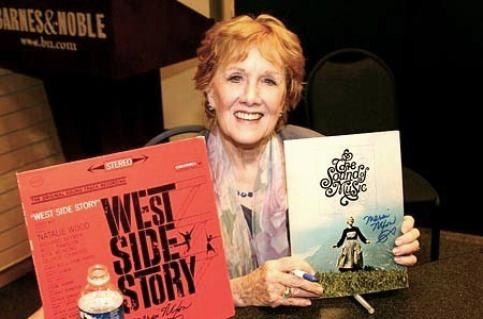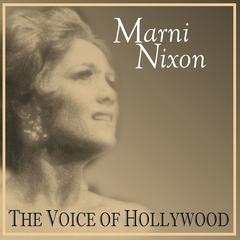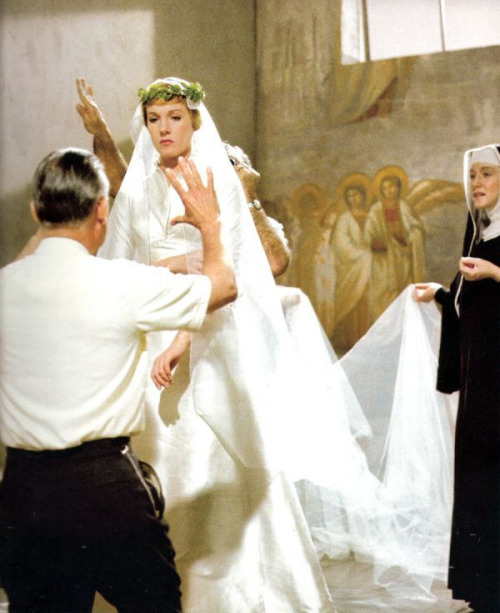It is with a heavy heart that I share the news that Marni Nixon, beloved voice of Hollywood's supersized musicals of the 50s and 60s has died of breast cancer at 86. It was a long and good and musical life, if never celebrated enough by the culture she gave so much to. It had been our long held dream to see her given an Honorary Oscar which must now be a dream unfulfilled. Because I don't have the words today, I thought I'd share a piece I wrote ten years ago on how special Marni Nixon was to me, a baby cinephile growing up with musicals as my favorite form of cinematic bliss.

Marni Nixon is my Kathy Selden
by Nathaniel R
Toward the end of Singin' in the Rain (1952), which chronicles Hollywood's seismic shift from silent films to sound production, a hilariously dim and screechy movie star Lina Lamont (Jean Hagen) gets her comeuppance. She has cruelly locked the sweet voiced Kathy Selden (Debbie Reynolds) into a contract to provide her a suitable movie voice. Lamont is after self-preservation: she can't make sound movies with her own unappealing voice, but she also cruelly takes pleasure in preventing Kathy from pursuing stardom. At a live performance Kathy stands behind a curtain, her dreams in tatters, as she sings for Lina. But Don Lockwood (Gene Kelly) pulls the curtain on the act in progress, rescuing his new girl from obscurity and dooming his former co-star to a fast fade.
 Singin' in the Rain is many things: a true musical masterpiece, a stellar romantic comedy, and the best movie Hollywood ever made about Hollywood (give or take Sunset Blvd). It's a completely absorbing viewing experience but for this: Every time I see it my mind drifts away to Marni Nixon during this particular scene. Kathy's story isn't exactly Marni's. Marni wasn't forced into submission as the silents were dying. But she was the songbird woman behind the curtain for beloved movie musicals and she was born in 1930 as the silents were emitting their death rattle (Hollywood studios had halted silent film production by 1929. Only a few emerged in movie houses of 30s). Marni Nixon was to be a famous voice but not a famous face ...just like the almost-fate of the fictional Kathy Selden.
Singin' in the Rain is many things: a true musical masterpiece, a stellar romantic comedy, and the best movie Hollywood ever made about Hollywood (give or take Sunset Blvd). It's a completely absorbing viewing experience but for this: Every time I see it my mind drifts away to Marni Nixon during this particular scene. Kathy's story isn't exactly Marni's. Marni wasn't forced into submission as the silents were dying. But she was the songbird woman behind the curtain for beloved movie musicals and she was born in 1930 as the silents were emitting their death rattle (Hollywood studios had halted silent film production by 1929. Only a few emerged in movie houses of 30s). Marni Nixon was to be a famous voice but not a famous face ...just like the almost-fate of the fictional Kathy Selden.
Marni started in showbiz early. She sang as a child and though trained in opera her instrument proved extremely versatile. Movie audiences first heard her as the voice of the angels in the Ingrid Bergman version of Joan of Arc (1948). That's a rather appropriate debut since her voice sure is heavenly. But her true claim to movie fame came in that decade long stretch from 1956 through 1965 when she was Kathy Selden to three (non-evil) Lina Lamonts: Deborah Kerr, Natalie Wood, and Audrey Hepburn in The King and I, West Side Story and My Fair Lady respectively. Nixon put the cherry on top of her filmography by appearing in the flesh in The Sound of Music. She was Sister Sophia.
I was obsessed with West Side Story as a child and watched it on TV every chance I got. I don't remember exactly when it was that I was told that Natalie Wood was not doing her own singing but at first I didn't believe it. The singing had the same accent. It sounded like the same voice. That's my Natalie Wood. I was very possessive of my movie stars even as a young brat. It's a mark of both my never ending love for the movie and the generosity of Nixon's career --so much contribution, so little acclaim -- that when I did finally accept this, it didn't diminish my enjoyment of the film but only added to it. Now I had Marni Nixon to love, too.
 Robert Wise directs Julie Andrews. Marni Nixon is off to the side as the nun Sister Sophia. She sings the "she waltzes on her way to mass..." line in 'How Do You Solve a Problem Like Maria?'
Robert Wise directs Julie Andrews. Marni Nixon is off to the side as the nun Sister Sophia. She sings the "she waltzes on her way to mass..." line in 'How Do You Solve a Problem Like Maria?'
I think it bears noting that she is a true actress in song. You can occasionally hear the seams from her voice to the actresses (I blame the sound work of the time) but she was doing difficult work with laser like precision, looping and adapting her instrument to the vocal tones, accents, and lip movements of non-trained singers. All that plus she was truly acting the songs, lending matriarchal warmth to The King and I, reinforcing the flush of new love for West Side Story -- boy can you hear Maria falling deeper and deeper -- and aiding in Hepburn's transformation from street urchin to high society prize in My Fair Lady.
If that weren't enough, Nixon was doing touch up work for still more actresses. She sang for Margaret O'Brien, Janet Leigh, and even this: it's reportedly Nixon's voice you're hearing when Marilyn Monroe belts out the one line "these rocks don't lose their shape" during "Diamond's are a Girls' Best Friend." Marni Nixon even played the animated geese in Mary Poppins. Basically it's like this: Only with your DVDs on mute can you watch a 50s or 60s movie musical without Marni Nixon secretly contributing to your enjoyment. She's a stealth giver.
Marni was the first non-movie star / non-director that I recognized as important to the cinema. I knew her name before I ever became devoted to watching end credits or following the careers of costume designers and cinematographers. She's come to represent to me all the unsung backstage heroes and heroines of film, the thousands of unfamiliar names and faces that help shape these great things we call movies.
In addition to the movie work she toured with both Liberace and Victor Borge and her son even composed the Golden Girls theme song "Thank You For Being a Friend". (Craziness!) After the reign of the movie musicals she taught voice lessons and occassionally performed.
Sometimes wandering around New York City, where she lived for decades, I wondered if I'd ever passed her on the street without even blinking, her face being unfamiliar but that chameleon voice, a thrilling transcendent soprano, completely embedded in my soul. I heard it around the family stereo (we had the vinyl on all of her musicals), I heard it in repertory movie houses in Detroit (her musicals were sell outs), I hear it now whenever I think about movie musicals (often). I've been hearing it my entire life. That Joan of Arc production got it right. She'll go on singing as the voice of the angels.
